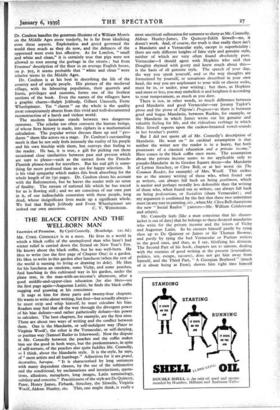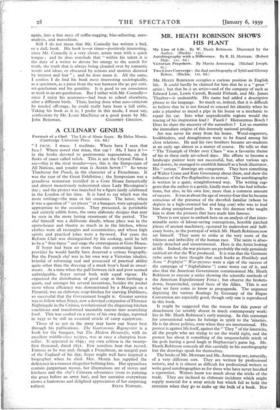THE BLACK COFFIN AND THE WELL-BORN MAN
Enemies of Promise. By Cyril Connolly. (Routledge. tzs. 6(1.) MR. CYRIL CONNOLLY is in a mess. He lives in a world in which a black coffin of the unemployed man who hasn't had winter relief is carried down the Strand on New Year's Eve. He knows about the black coffin, but he was well-born. He likes to write (see the first page of Chapter One) in a garden. He likes to write in this garden after luncheon (when the rest of the world is earning its living or drawing its dole). He likes for his luncheon an omelette, some Vichy, and some peaches. And lunching in this cultivated way in his garden, under the plane tree, in the man-with-an-income's afternoon, after a good middle-and-upper-class education (he also likes—see the first page again—Augustan Latin), he finds the black coffin nagging and gnawing at his conscience.
It nags at him for three parts and twenty-four chapters. He wants to write about writing, but first—but actually always— he must strip and whip himself, he must calculate his bias. Readers may feel that all the way through the divergent power of his bias defeats—and rather pathetically defeats—his power to calculate. The best chapters, for example, are the first nine. These are about two ways of writing and the conflict between them. One is the Mandarin, or self-indulgent way (Pater to Virginia Woolf), the other is the Vernacular, or self-denying, or puritan way (Samuel Butler to Isherwood). Now the dispute in Mr. Connolly between the peaches and the coffin makes him see the good in both ways, but the predominance, in spite of self-torture, of the peaches also quite fuddles Mr. Connolly, so I think, about the Mandarin style.. It is the style, he says, of " most artists and all humbugs." Adjectives for it are grand, decorative, baroque. " It is characterised by long sentences with many dependent clauses, by the use of the subjunctive and the conditional, by exclamations and interjections, quota- tions, allusions, metaphors, long images, Latin terminology, subtlety and conceits." Practitioners of the style are De Quincey, Pater, Henry James, Firbank, Strachey, the Sitwells, Virginia Woolf, Aldous Huxley, etc. This, one might think, is really a
most uncritical collocation for someone so sharp as Mr. Connolly. Aldous Huxley-James, De Quincey-Edith Sitwell—no, it doesn't work. And, of course, the truth is that really there isn't a Mandarin and a Vernacular style, except in superficiality : there are only different heights of false style and genuine style, neither of which are very often found absolutely pure. Vemacular—I should agree with Hopkins who said that Doughty rhymed with gouty and knew much about this— is the basis of all genuine style. The speech of your day, the way you speak yourself, and so the way thoughts are formulated by yourself, or sensations described in your own head, the way you are unpleasant to your wife or choose socks, must be in, or under, your writing ; but then, as Hopkins said more or less, you may embellish it and heighten it according to your temperament, as much as you dare.
There is not, in other words, so much difference between good Mandarin and good Vernacular—say Jeremy Taylor's prose and the prose of Pilgrim's Progress—as there is between good and bogus Mandarin, between Ruskin, for example, or the Mandarin in which James wrote out his genuine and valuable feeling for life, and the ridiculous verbiage in which Miss Sitwell reports upon the cuckoo-breasted vowel-sounds in her brother's poetry.
But I did not quote all of Mr. Connolly's description of Mandarin. He went on " its cardinal assumption is that neither the writer nor the reader is in a hurry, but both possessors of a classical education and a private income." Here comes in the black coffin once more. The assumption about the private income seems to me applicable only to pseudo-Mandarin in its Gordon Square decay—the Mandarin of Lytton Strachey, or Clive Bell, or at her worst (in The Common Reader, for example) of Mrs. Woolf. This strikes me as the uneasy writing of those who, when found out as writers, can always fall back on being gentlemen, which is nastier and perhaps morally less defensible than the writing of those who, when found out as writers, can always fall back on being proletarians, or Socialists (sham Vernacular) ; and my argument is confirmed by the fact that these two sometimes meet (at any rate in painting, viz., when Mr. Clive Bell champions the new " Social Realist " painters—Mr. William Coldstream and others).
Mr. Connolly feels (like a man conscious that his dinner- jacket is out of date) that he belongs to these decayed mandarins who write for the private income and the lovers of Vichy and Augustan Latin. So he excuses himself partly by tying them up to De Quincey or James or Sir Thomas Browne, and partly by tying the bad Vernacular or Puritan writers to the good ones, and thus, as I say, falsifying his division. The Second Part of his book, chapters ten to sixteen, dealing with the enemies of good writing at the present (journalism, politics, sex, escape, success), does not get him away from himself, and the Third Part, " A Georgian Boyhood " (much of it about being at Eton), shoves him right into himself
again, into a fine mess of coffin-nagging, bias-adjusting; auto- analysis, and masochism.
Still I do not mean that Mr. Connolly has written a bad, or a dull, book. His book is—at timespositively interesting, since Mi. Connolly is a very clever, astute man with a quick tongue ; and he does conclude that " within his talent it is the duty of a writer to devote his energy to the search for truth, the truth that is always being clouded over by romantic words and ideas, or obscured by actions and motives dictated by interest and fear " ; and he does mean it. All the same, I confess I do fmd his book most interesting sociologically, as a specimen, as a piece from the war between the 90 per cent. art-gentleman and his gentility. It is good to see Conscience at work in an art-gentleman. But I rather wish Mr. Connolly— since I enjoy his acuteness—had been to school elsewhere, after a different birth. Then, having done what auto-criticism he needed off-stage, he could really have been a full critic. Taking his book as it is, I prefer in this mode, I must say, confessions by Mr. Louis MacNeice or a good poem by Mr.











































 Previous page
Previous page